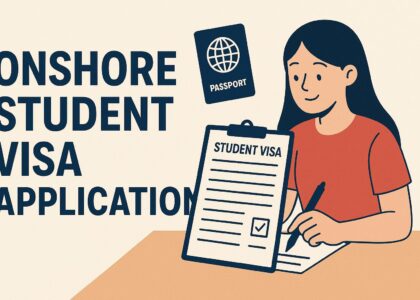Australia is implementing significant changes to its student visa application process, effective from July 1, 2024. These changes are designed to streamline visa procedures and discourage ‘visa hopping’ among temporary visa holders. Whether you’re planning to study, work, or visit Australia, understanding these updates is crucial to navigating the visa landscape effectively. Australia New Student Visa Rules July 2024
Understanding the Changes
Starting July 1, 2024, holders of certain visas, including Visitor and Temporary Graduate visas, will no longer be able to apply for Student visas while residing in Australia. This policy shift aims to ensure that individuals with a genuine intention to study in Australia apply for their student visa from offshore, outside of Australia’s borders. Applications lodged within Australia before this date will continue to be processed under existing rules, providing a transition period for affected individuals. Australia New Student Visa Rules July 2024

Impact on Temporary Graduate Visa Holders
Temporary Graduate Visa (Subclass 485)
Temporary Graduate visa holders are among those significantly affected by the new regulations. Previously, many graduates used their Temporary Graduate visas as a pathway to extend their stay in Australia. However, with the new rules, these individuals will need to reconsider their options upon completing their studies. The Australian government encourages temporary graduates to explore skilled job opportunities that could lead to employer-sponsored visas or permanent residency, aligning with Australia’s long-term economic and immigration goals. Australia New Student Visa Rules July 2024
Challenges and Opportunities for Visa Holders
The transition from temporary to permanent residency is a key consideration for many visa holders affected by these changes. According to the Grattan Institute’s ‘Graduates in Limbo’ report, a significant portion of Temporary Graduate Visa holders opt to return to study when their visa expires, highlighting the complexities of Australia’s visa system and the varied pathways available to individuals seeking to extend their stay.
Key Visa Subclasses Affected
The following visa subclasses are specifically impacted by the new rules:
- Subclass 485 (Temporary Graduate Visa): Designed for international students who have recently graduated from an Australian educational institution.
- Subclass 600 (Visitor Visa): Allows individuals to visit Australia for tourism or business purposes.
- Subclass 601 (Electronic Travel Authority): Simplifies the process for short-term visits to Australia for tourism or business.
- Subclass 602 (Medical Treatment Visa): Facilitates travel to Australia for medical treatment.
- Subclass 651 (eVisitor Visa): Enables individuals to visit Australia for short-term tourism or business purposes.
- Subclass 988 (Maritime Crew Visa): Designed for maritime crew members operating on vessels traveling to or from Australia.
Additionally, other visa subclasses restrict the ability to apply for a Student visa while in Australia, including:
- Subclass 403 (Temporary Work (International Relations)) – Domestic Worker (Diplomatic or Consular) Stream
- Subclass 995 (Diplomatic Temporary Visa) – Primary Visa Holders Only
Understanding these visa subclasses and their implications is essential for anyone planning to study or work in Australia under the new regulations.
Application Process and Requirements
Applying for a Student Visa from Offshore
Under the new rules, individuals intending to study in Australia must apply for their Student visa from outside the country. This process involves several steps:
Preparation:
Gather all necessary documentation, including proof of enrollment in a registered Australian educational institution, financial capacity, and health insurance coverage.
Online Application:
Complete the online application form available through the Department of Home Affairs website or through a registered migration agent.
Biometric Information:
Depending on your nationality, you may need to provide biometric information as part of the application process.
Health and Character Requirements:
Applicants must meet health and character requirements specified by the Australian government. This may involve medical examinations and police clearance certificates.
Visa Grant:
Upon approval, you will receive a notification of your visa grant and information on visa conditions, including entry and stay requirements.

Bridging Visas and Other Considerations
Unlike some visa types, Offshore Student visa applicants cannot receive a Bridging visa to remain in Australia while awaiting a decision on their application. It is essential to plan your travel and accommodation arrangements accordingly to comply with Australian immigration laws.
Educational Opportunities and Immigration Pathways
Australia offers a range of educational opportunities across various fields and disciplines. International students contribute significantly to Australia’s education sector and economy, enriching the cultural fabric of the country. For those aiming to pursue further studies or establish a career in Australia, understanding the available immigration pathways is crucial.
Frequently Asked Questions (FAQs) about Australia’s New Student Visa Rules
What are the new changes to the Australian student visa rules starting July 1, 2024?
Starting July 1, 2024, holders of certain visas, including Visitor and Temporary Graduate visas, will no longer be able to apply for Student visas while residing in Australia. This change aims to ensure that student visa applicants apply from offshore (outside Australia).
Which visa subclasses are affected by the new rules?
The specific visa subclasses impacted by the new rules include Subclass 485 (Temporary Graduate), Subclass 600 (Visitor), Subclass 601 (Electronic Travel Authority), Subclass 602 (Medical Treatment), Subclass 651 (visitor), and Subclass 988 (Maritime Crew).
Can I still apply for a student visa if I am currently in Australia on one of the affected visas?
If you lodge your student visa application before July 1, 2024, it will still be processed under the existing rules. However, after this date, you will need to apply from offshore.
Why has the Australian government implemented these changes?
The changes aim to prevent ‘visa hopping,’ where individuals extend their stay in Australia through multiple visa applications. The government wants to ensure that only those with a genuine intention to study in Australia apply for student visas.
What should I do if my Temporary Graduate visa is expiring soon?
Temporary Graduate visa holders should explore skilled job opportunities that might lead to employer-sponsored visas or permanent residency. Alternatively, they can return to their home country and apply for a new visa from offshore.
Can Visitor visa holders apply for a student visa while in Australia?
No, starting July 1, 2024, Visitor visa holders must apply for a student visa from offshore. However, they can still study for up to three months on a Visitor visa.
Are there any exceptions to the new student visa application rules?
Holders of Working Holiday Maker and Work and Holiday visas are not affected by these changes and can still apply for student visas while in Australia.
What are the requirements for applying for a student visa from offshore?
You need to provide proof of enrollment in an Australian educational institution, demonstrate financial capacity, obtain health insurance, and meet health and character requirements.
Can I receive a Bridging visa while waiting for my student visa application to be processed?
No, Offshore Student visa applicants cannot receive a Bridging visa to stay in Australia while waiting for their application to be processed.
How long does it take to process a student visa application?
The processing time for student visa applications can vary. It is advisable to apply well in advance of your intended study start date to ensure timely processing.
Can I continue my studies if my visa application is still pending?
If you applied before July 1, 2024, and are awaiting a decision, you can continue your studies under the conditions of your current visa. If applying after this date, you must apply from offshore and wait for the outcome before starting your studies.
What should I do if I need to apply for a student visa after July 1, 2024?
You should leave Australia and apply for your student visa from offshore. Ensure you have a visa that allows you to enter and remain in Australia once your student visa is granted.
How can I stay updated on changes to Australian visa regulations?
Regularly check the Australian Department of Home Affairs website and subscribe to updates from reputable immigration consultants or legal advisors for the latest information on visa regulations.
Can I apply for a different type of visa while in Australia?
Yes, you can explore other visa options such as employer-sponsored visas or permanent residency pathways. Consult with a registered migration agent or immigration lawyer for personalized advice.
Where can I get help with my visa application?
You can contact us at StudentVisaAustralia.com for free expert advice on applying for a student visa, work permit, or any visa-related queries. Our team is here to assist you in navigating the visa application process successfully.
Conclusion: Australia’s new student visa regulations reflect its commitment to managing immigration in a way that prioritizes national interests while maintaining a welcoming environment for international students and visitors. As regulations and policies evolve, staying informed and seeking expert advice are essential steps in navigating the visa application process successfully.

Contact Us: Navigating visa regulations can be complex, but you don’t have to do it alone. Contact us at StudentVisaAustralia.com for free expert advice on applying for a student visa, work permit, or any visa-related queries. Our team is here to help you achieve your educational and career goals in Australia.
Disclaimer:
The information provided in this guide is based on current regulations and announcements from the Australian government. Visa policies can change, and individual circumstances may vary. It is advisable to consult with registered migration agents or immigration lawyers for personalized advice tailored to your specific situation.
Source: www.financialexpress.com
- Cost of MBA in Abroad: Detailed Guide for USA, UK, Australia, Europe, China, and Asia
- Australia’s New Rules for Temporary Graduate Visa Holders
- Navigating Australia’s Updated Student Visa Regulations: A Comprehensive Guide
- Australian Student Visa Financial Requirements Updated: What You Need to Know
Also read:
- Onshore Student Visa Application: Complete Guide for International Students in 2025
- Australia’s New Student Visa Rules in 2025 – Expert Tips for Indian Students
- How to Improve English & Communication Skills in Australia
- Top Tips for International Students in Melbourne: A Complete Guide
- Your Ultimate Guide to Pursuing an MBA in Australia – Everything You Need to Know





